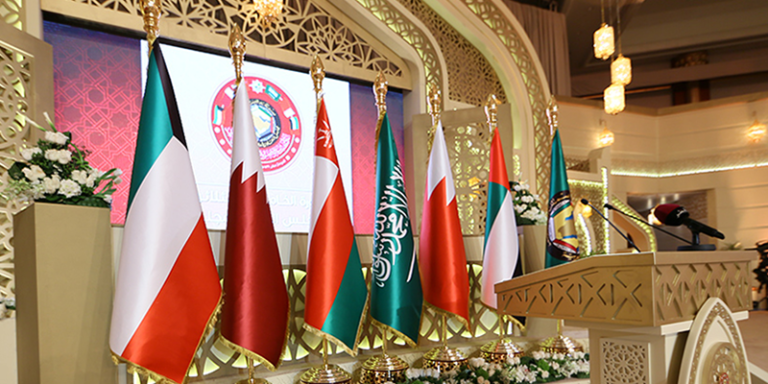
Representatives from all six Arab Gulf states are gearing up to attend the annual summit of the Gulf Cooperation Council (GCC) in Saudi Arabia on December 9. As with the 2017 summit in Kuwait, the meeting will be watched closely by regional and international observers for signs of whether the worst political crisis in the GCC’s 37-year history is any closer to resolution. Key issues such as the level of each state’s representation and agenda items remain unclear and may not become apparent until the opening of the summit itself. What is becoming clearer is that the GCC as it existed between 1981 and 2017 is in abeyance, and that what remains today is a technocratic core stripped of necessary aspects of political cooperation, cohesion, and unity of purpose. In its place, a multi-layered patchwork of interests and alignments is emerging, a condition that portends continuing volatility in the Arabian Peninsula, a region hitherto considered one of the most politically stable parts of the Arab world.
Last year’s Kuwait summit broke up in acrimony after little more than an hour and was overshadowed by the simultaneous announcement of the formation of a Saudi-Emirati Coordination Council that appeared to formalize the hawkish new axis running through the Gulf’s political arena. The 2017 summit took place six months to the day after three GCC states – Bahrain, Saudi Arabia, and the United Arab Emirates (UAE) joined with Egypt to try and isolate a fourth GCC member, Qatar, diplomatically and economically. With the Gulf rift still raw in the memory, the very fact that the summit in Kuwait convened at all was a testament to the regard with which Kuwait’s 89-year old emir, Sheikh Sabah al-Ahmad Al Sabah, is held as the respected elder statesman of the Gulf. Immediately afterwards, it was announced that Oman would transfer its hosting of the 2018 summit to Riyadh, the Saudi capital and home to the GCC Secretariat, but still chair the ministerial and committee meetings.
Much was made last year of the fact that, aside from the host, Kuwait, only one other head of state, Sheikh Tamim bin Hamad Al Thani of Qatar, attended the Supreme Council portion of the annual summit. This absence of other leaders was not without precedence. In practice, two heads of state, Sultan Qaboos of Oman and President Khalifa bin Sayed Al Nahyan of the UAE, had not attended GCC summits for a while, and a special midyear ‘consultative’ summit called for by the Saudis in May 2012 was similarly underattended by heads of state. Instead, where the ‘snub’ occurred was in the lower alternate level of representation from Saudi Arabia, Bahrain, and the UAE, which sent only their foreign ministers or their deputies, as did Oman. It will certainly be instructive to see the level of seniority of representation that will turn up in Riyadh on December 9.
In 2017, the GCC rift was left purposefully off the agenda but was very much the elephant in the room that contributed to the cancellation of the second day of the summit and the decision to end proceedings after just the opening morning session. It appears as if a similar decision has been made for this year’s summit which has, in any case, only been scheduled as a day-long affair. If so, it reflects a way for the GCC to survive as an entity whose technocratic aspects and achievements are preserved by firewalling them from the contentious political issues that continue to divide, rather than unite, the six member-states. A meeting of GCC housing ministers, for example, took place in Kuwait on October 1, 2018, during which participants endorsed a common GCC-wide housing action plan and other means of coordination, such as the creation of a statistical center and database. Similarly, the GCC Interconnection Authority continues to function and to connect the electrical grids of all the six Gulf states.
In other areas that are considered less technocratic and more obviously political, workarounds have been put in place that paper over some of the cracks that have opened over the past two years. Meetings of GCC chiefs of staff in Kuwait and foreign ministers in New York occurred in September 2018 but in both instances did so with US counterparts in the room and, in the case of the foreign ministers, with their colleagues from Egypt and Jordan as well, in a gathering packaged more as moving toward the Trump administration’s so-called ‘Arab NATO’ than as a ‘GCC’ event. Taking the politics out of the GCC and placing it in initiatives such as the Middle East Strategic Alliance, if it takes off, may, at the very least, ensure that the GCC is not torn apart by the multiple political flashpoints that extend far beyond the fault-line that erupted over the Saudi/Bahraini/Emirati ‘troika’ and their attempt to isolate Qatar in 2017.
Regardless of what happens on December 9, the likelihood is that the GCC as it functioned up until 2017 is not coming back anytime soon, if indeed at all. The personality-driven policies pushed by the Crown Princes of Saudi Arabia and Abu Dhabi, Mohammed bin Salman and Mohammed bin Zayed, have fractured Gulf politics in more ways than one. Tensions exist also between Kuwait and Saudi Arabia, especially in the wake of Mohammed bin Salman’s visit to Kuwait on September 30, which was cut short, and between Oman and the UAE, in part over Abu Dhabi’s policies in southern and eastern Yemen and toward the broader Horn of Africa and Indian Ocean littoral. Neither Kuwait nor Oman, to say nothing of Qatar, shares the hyper-hawkish approach of Riyadh or Abu Dhabi to regional affairs, and are aware that they may be next to come under pressure to conform to the Saudi-Emirati geopolitical and foreign policy straitjacket. As the last two survivors of the generation that created the GCC, both Sultan Qaboos and Emir Sabah (who, as leader of Oman and long-time foreign minister of Kuwait were intimately involved in crafting the GCC as it came together in 1981) have exhibited an attachment to the spirit of collective cooperation that may struggle to survive their eventual passing, and transfer to the group of headstrong younger leaders.
The GCC therefore will endure but at a diminished level from what policymakers have been used to in the past. Practical technocratic ties will continue to bind together the six member-states and prevent the breakup of what had been one of the most enduring and successful examples of regional cooperation in the Arab world. However, relations of trust have been shattered and will be far harder, and take a lot longer, to recohere. After all, not once, but twice in three years, the GCC Secretariat was shown to be unable (or unwilling) to prevent three of its members from turning on a fourth, first in 2014, when the Saudi/Bahraini/Emirati trio withdrew their ambassadors from Doha for nine months, and again with the ongoing blockade of Qatar since 2017. Moreover, the GCC and its mechanisms have been bypassed at each stage of the current crisis, from the initial communication of grievances to the subsequent efforts to mediate in the dispute. In this atmosphere of continuing polarization, falling back on the common technocratic denominator is probably the most that can be hoped for in the ongoing failure to resolve the larger political disputes roiling the Gulf.

